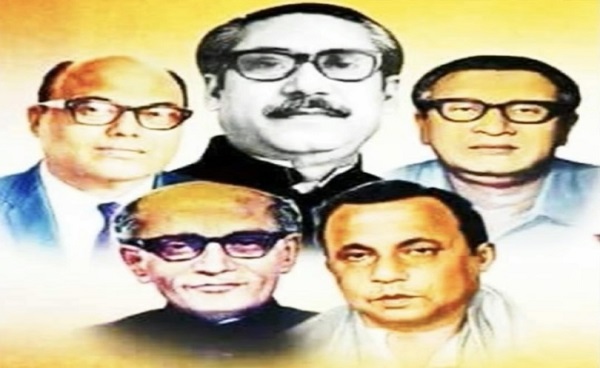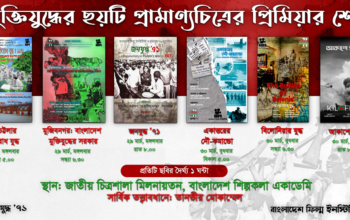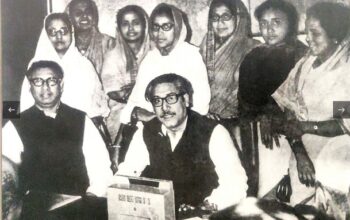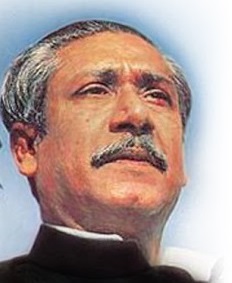
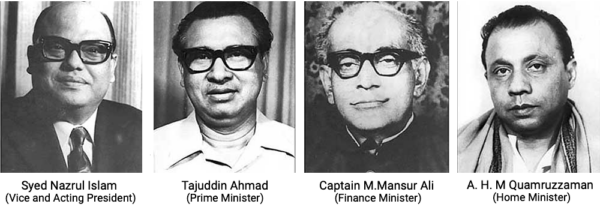
Syed Nazrul Islam, Tajuddin Ahmad, Captain M. Mansur Ali and A.H.M. Quamaruzzaman were four key leaders who formed the First Government of Bangladesh and led the Liberation War on behalf of Bangabandhu Sheikh Mujibur Rahman. Tajuddin Ahmed, as the Prime Minister, was able to garner India’s support early on for the Bangladesh Government and Bangladesh Mukti Bahini, after a meeting with Indian Prime Minister Indira Gandhi in New Delhi, which was a crucial turning point in Bangladesh’s Liberation War for Independence.
Colonel M.A.G. Osmani, was appointed the Commander-in-chief of Bangladesh Military and Mukti-Bahini. For the Liberation War, the country was divided into eleven sectors with each sector lead by a commander drawn from the military.
- Established: April 10, 1971
- Oath Taking Ceremony: April 17, 1971
- Location: Baidyanathtala, Meherpur, Kushtia, Bangladesh
- President: Bangabandhu Sheikh Mujibur Rahman
- Vice President and Acting President: Syed Nazrul Islam
- Prime Minister: Tajuddin Ahmad
- Finance, Commerce and Industry Minister: Captain M. Mansur Ali
- Home, Agriculture, Relief and Rehabilitation Minister: A. H. M Quamruzzaman
First Bangladesh Government, in 1971, operated as a war-time full administration
- First Bangladesh Government – its formation & success – a short historical analysis (in Bangla)
- Two Men … and Their Trek to Mujibnagar – Formation of the First Government – Syed Badrul Ahsan, Daily Sun, Apr 4, 2021
First Government at Mujibnagar issued postal stamps during liberation War Postal History of 1971
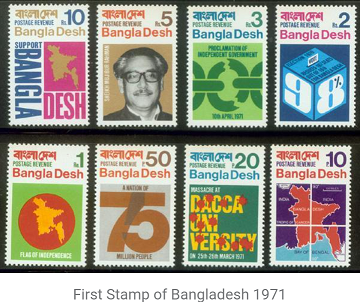
Following are from Joy Bangla News Paper (established by First Bangladesh Government, 1971). The two reports of Prime Minister Tajuddin Ahmad and Vice President Syed Nazrul are very important to understand their position vis-a-vis Pakistan’s attempt of compromise with International diplomacy and release of Bangabandhu.
প্রধানমন্ত্রীর প্রতিক্রিয়া “পাকিস্তানের কাঠামোতে কোন আপোসের প্রশ্নই উঠতে পারে না”
সূত্র– জয়বাংলা পত্রিকা
তারিখ– ২ জুন ১৯৭১
পাকিস্তানের কাঠামোতে কোন আপোসের প্রশ্নই উঠতে পারে না
–তাজউদ্দীন
“বাংলাদেশ একটি স্বাধীন–সার্বভৌম রাষ্ট্র । পাকিস্তানের কাঠামোতে কোন রকম আপোস–মীমাংসার প্রশ্ন উঠতে পারে না।”
গত রোববার মুজিব নগর “জয় বাংলা” প্রতিনিধির সাথে এক বিশেষ সাক্ষাতকারে বাংলাদেশ সরকারের প্রাধানমন্ত্রী জনাব তাজউদ্দীন এ ঘোষণা করেন। বহির্বিশ্বে বিভিন্ন মহলে বাংলাদেশ সমস্যার “রাজনৈতিক সমাধান” সম্পর্কে যেসব কথা–বার্তা উঠেছে তৎসম্পর্কে জিজ্ঞাসা করা হলে জনাব তাজউদ্দীন উপরোক্ত ঘোষণা করেন।
জনাব তাজউদ্দীন আরও বলেন, “যে–কোন মূল্যের বিনিময়ে বাংলাদেশের জনগণ তাদের পৃথক সত্তা ও স্বাধীনতা রক্ষা করবে।”
বাংলাদেশের প্রধানমন্ত্রী বলেন, “বাংলাদেশের মুক্তিবাহিনীর হাতে নিশ্চিহ্ন হওয়ার আগেই যদি তথাকথিত পাকিস্তানের সামরিক জান্তা তাদের খুনী সৈন্যবাহিনীকে বাংলাদেশের মাটি থেকে সরিয়ে নেন, তবে সেটাই হবে তাদের পক্ষে সবচেয়ে বুদ্ধিমানের কাজ।”
অল ইন্ডিয়া রেডিওতে প্রচারিত বাংলাদেশের প্রধানমন্ত্রীর সাক্ষাতকার
সূত্র– দি টাইমস অব ইন্ডিয়া, দিল্লী
তারিখ– ৩ জুন ১৯৭১————————————
FREEDOM AT ALL COSTS:
TAJUDDIN
Report of Mr. Tajuddin Ahmad’s, interview with AH India Radio on June 2, 1971
The Bangladesh Prime Minister, Mr. Tajuddin Ahmad said in Mujibnagar today that Bangladesh is sovereign and independent and its people will defend its separate and free entity at all costs.
In an interview with All-India Radio, Mr. Ahmad reiterated our irrevocable commitment to a policy of friendship for all, especially or neighbors irrespective of variations in the response of world Powers to our present difficulties. “Beyond this it is not possible to define too rigidly the foreign policy or a two month-old State”, Mr. Tajuddin said in reply to a question. He added: “There are encouraging developments and no final judgment need be made on the long-term developments.”
The Prime Minister said that any attempt, if made, to install a puppet government in Dacca, will certainly be abortive for “no collaboration between the killers and the quislings will be tolerated by the people of Bangladesh who are struggling for securing and protecting their independence.”
Asked about Pakistan Government’s claim that Sheik Mujibur Rahman had been taken to Dacca and that he had urged the people to cooperate with the army, Mr. Ahmad said: “We do not know where exactly Sheikh Sahib has been detained by the Pakistan Government. But the claim that has urged the people to cooperate with the army of Pakistan should be rejected with utmost contempt. The claim is preposterous.”
Mr. Ahmad said his Government had approached the United States for intervening for a political settlement. “We should like to make it absolutely clear to everyone that there is no room for compromise within the framework of Pakistan, Bangladesh is sovereign and independent and we shall defend its separate and free entity at any cost.
Big Powers’ silence
Asked what was his Government’s feeling about the silence or ambivalence of big Powers, especially the U.S.A., the United Kingdom and the Soviet Union, Mr. Ahmad replied: “Our friendship for all” policy shall continue to guide our foreign policy irrespective of the variations in the response of world powers to our present difficulties.
He said the work of the emissaries sent by his Government abroad was bearing fruit in creating favorable lobbies in these areas and in organizing public opinion in favor of Bangladesh.
Asked about the present functioning of his Government, Mr. Tajuddin said it never lost contact with the vast rural areas of Bangladesh and “we are in contact with cities and towns in occupied areas through our local leadership cadres. We have set up an administrative machinery for the areas within our control as well as a centralized command for all operations aimed at driving the enemy out.
Questioned about the reported activities of the Leftist forces in Bangladesh, Mr. Ahmad said that as far as Bangladesh was concerned “we do not know of any problem of Leftist forces. Only the other day a nationwide election was held and the people of Bangladesh rose as one man in support of their demands. And also all people, irrespective of their political opinions, and all patriotic elements are rallying together to give their unstinted support for the cause of the independence of Bangladesh.
He added: “Maulana Bhashani of the National Awami Party and other patriotic leaders and elements have already held out their unqualified support to the struggling people and the Bangladesh Government and demanded its recognition by other countries.”
(The Times of India, New Delhi-June 3, 1971)
রাজনৈতিক সমাধান প্রশ্নে ভারপ্রাপ্ত রাষ্ট্রপতি সৈয়দ নজরুল ইসলাম কর্তৃক ৬ই জুন চার দফা প্রস্তাব
সূত্র– জয় বাংলা পত্রিকা
তারিখ– ১৮ই জুন ১৯৭১
বাংলার মানুষ আর গোঁজামিল গ্রহণ করবে না
–সৈয়দ নজরুল ইসলাম
গণ–প্রজাতন্ত্রী বাংরাদেশ সরকারের অস্থায়ী রাষ্ট্রপ্রধান সৈয়দ নজরুল ইসলাম গত ৬ই জুন সংগ্রামী বাঙ্গালী জাতির উদ্দেশে প্রদত্ত এক বেতার ভাষণে বলেন, গণ–প্রজাতন্ত্রী বাংলাদেশ সরকারের রাষ্ট্রপ্রধান বঙ্গবন্ধু শেখ মুজিবুর রহমান ও আটক সকল গণ–প্রতিনিধিদের অবিলম্বে মুক্তিদান, বাংলাদেশের মাটি থেকে হানাদারবাহিনী ফিরিয়ে নেয়া, স্বাধীন ও সার্বভৌম বাংলাদেশকে স্বীকৃতিদান এবং পশ্চিম পাকিস্তানী শোষকশ্রেণী কর্তৃক এ যাবৎ বাংলাদেশ থেকে অপহৃত ধনসম্পদ ও গত আড়াই মাসের লড়াইয়ে হানাদার বাহিনী বাংলাদেশের যে ক্ষতিসাধন করেছে একটি আন্তর্জাতিক সংস্থার মাধ্যমে তা নির্ণয় করে লুণ্ঠিত ধন প্রত্যর্পণ ও পূর্ণ ক্ষতিপূরণের দ্বারাই কেবল রাজনৈতিক সমাধান আসতে পারে অন্যথায় রাজনৈতিক সমাধানের কোন প্রশ্নই উঠতে পারে না।
তিনি বিভিন্ন পত্র–পত্রিকায় রাজনৈতিক সমাধান বা আপোস মীমাংসা সম্পর্কে যে জল্পনাকল্পনা চলছে সে সম্পর্কে মন্তব্য করতে গিয়ে বলেন, বাংলাদেশের সাড়ে সাত কোটি মানুষ কোন গোঁজামিলের সমাধান গ্রহণ করবে না।
আমাদের অস্থায়ী রাষ্ট্রপ্রধান বলিষ্ঠ কণ্ঠে ঘোষণা করেন, বাংলাদেশের মাটিতে আর কোনদিন সাম্প্রদায়িকতা মাথা চাড়া দিয়ে উঠতে পারবে না। এদেশের স্বাধীনতার সংগ্রামে সকল বাঙালী হিন্দু–মুসলমান–বৌদ্ধ–খৃষ্টান একসাথে লড়েছেন– বুকের তপ্ত লহু ঢেলে দিয়ে বাংলার মাটি সিক্ত করে তারা এটাই প্রমাণ করেছেন যে, এদশের প্রতিটি প্রাণ ঐক্যবদ্ধ, অভিন্ন।
স্বাধীন বাংলা বেতারকেন্দ্র থেকে প্রচারিত ভাষণে তিনি বলেন, স্বাধীনতার সংগ্রামে হিন্দু কৃষক জীবন দিয়েছেন, প্রাণ দিয়েছেন মুসলমান কৃষক। মসজিদ পুড়েছে হানাদার দস্যুদের হাতে, পুড়েছে মন্দির গীর্জা আর বৌদ্ধ বিহার বিধ্বস্ত হয়েছে। বর্বর পাক–সেনারা হত্যা করেছে ডঃ গোবিন্দ দেব, অধ্যাপক মনিরুজ্জামান,
জ্যোতির্ময় গুহ ঠাকুরতা ও ফজলুর রহমানকে। আমরা একসঙ্গে লড়েছি, একই সাথে জয়ী হবো। এবং জয়ী আমরা হবই।
সৈয়দ নজরুল ইসলাম বলেন, হানাদার দস্যু ইয়াহিয়ার বর্বর সৈনিকদের নির্মম অত্যাচারে কৃষক–মজদুর, ছাত্র, শিক্ষক, মধ্যবিত্ত আর অসংখ্য মানুষ বাংলার শ্যামল মাটির বুক ছেড়ে ভারতে চলে যেতে বাধ্য হয়েছেন! তাদের তিনি আশ্বাস দিয়ে বলেন, শত্রুহননের পর মুক্ত স্বদেশে ফিরে আমরা তাঁদের আপন ‘ভিটেমাটিতে প্রতিষ্ঠিত করবই।
এই প্রসঙ্গে আমাদের অস্থায়ী রাষ্ট্রপ্রধান দেশত্যাগ করে যে সব বাঙালী ভাই প্রতিবেশী রাষ্ট্র ভারত আর বার্মায় আশ্রয় নিয়েছেন, তাদের সাহায্য করায় ভারত সরকার ও বার্মা সরকারের কাছে কৃতজ্ঞতা প্রকাশ করেন।
মুক্তিযোদ্ধাদের বীরত্বের প্রশংসা করে সৈয়দ নজরুল ইসলাম বলেন, বাংলাদেশ সরকারের সীমিত সামর্থের জন্য আপনাদের প্রয়োজন সর্বক্ষেত্রে পূরণ করা সম্ভব হচ্ছে না বিভিন্ন রণাঙ্গনে আপনারা যে অসীম অটল মনোবলের পরিচয় দিচ্ছেন, তার জন্যে আজ সারা বাঙালী জাতি গর্বিত দেশমাতৃকার বীর সন্তান আপনারা। এ সংগ্রামে আপনাদের যেসব সাথী শহীদ হয়েছেন, যারা পঙ্গু হয়েছেন তাদের পরিবারবর্গের রক্ষণাবেক্ষণের পুরো দায়িত্ব আমার সরকার ইতিপূর্বেই গ্রহণ করেছেন।
তিনি বলেন, মুক্তিবাহিনীর বীর সৈনিকেরা আমাদের আন্তরিক অভিনন্দন গ্রহণ করুন।
————————————
শেখ মুজিবের নিরাপত্তার জন্য বিশ্বের শক্তিশালী রাষ্ট্রবর্গের কাছে প্রধানমন্ত্রী তাজউদ্দীন আহমদের আবেদন
সূত্র: এশিয়ান রেকর্ডার আগস্ট ৬–১২, ১৯৭১
তারিখ: ১৩ জুন, ১৯৭১
Safety of Sheikh Mujibur Rahman
Mr. Tajuddin Ahmed’s Appeal to World Powers:
The Prime Minister of Bangladesh, Mr. Tajuddin Ahmed on June 13 appealed to all nations of the world to ensure the safety of Sheikh Mujibur Rahman, “the undisputed leader of the people of Bangladesh,” and to secure his release.
In a broadcast to the nation from Swadhin Bangla Betar Kendra, he said that the accusation of President Yahya Khan that the Sheikh had hatched a plot to arrest him in Dacca was “as crude as it is grotesque.”
Appealing to the nations of the world to accord recognition to the Bangladesh Government, he said this Government alone represented legitimacy in our land founded, as it is, upon the freely expressed will of its people. Our people have completely repudiated the colonial rule based in West Pakistan and are now fighting to defend their freedom.”
“I should like to assure those who have not taken any position on our struggle or have been only lukewarm towards it or opposed it outright, that the People’s Republic of Bangladesh is on the map of the world and the determination of its 75 million people will keep it there. Is it rational for nations to ignore so vast a section of mankind?” he asked.
In a special word to those Muslim and Arab countries who had not yet condemned the mass slaughter in Bangladesh, he said: “It is a tragic error on their part to think that Yahya’s hordes are waging a war of Islamic righteousness in Bangladesh. Their silence, therefore, condones colonialism and barbarism. Material support to Islamabad puts them on the side of dictatorship.”
The war of liberation, he said, was now in the 11th week and the valiant freedom fighters had put despair into President Yahya Khan’s heart. The staggering casualty figure of the West Pakistani Army testified to the success of the defensive operations. The twin methods of massive terror and under had not succeeded in breaking the will of a nation determined to fulfill its destiny of freedom. The usurping enemy, on the other hand, was in a hopeless mess.
The refusal of the people to co-operate had resulted in an economic crisis which the military junta could not resolve without foreign aid. It had now resorted to demonetization of 100 and 500-rupee currency notes. This was not only a plan admission of its economic desperation but a shameless attempt to rob the people of what was theirs in order to replenish its coffers in Islamabad.
Congratulating the people of Bangladesh on their heroic resistance, he said in the new phase of their struggle, the freedom fighters were better organized and their ranks were swelling with new recruits.

